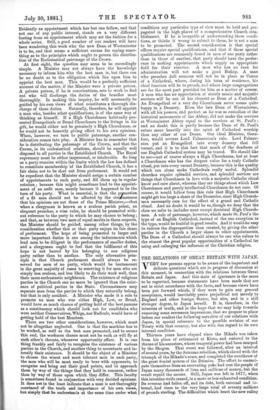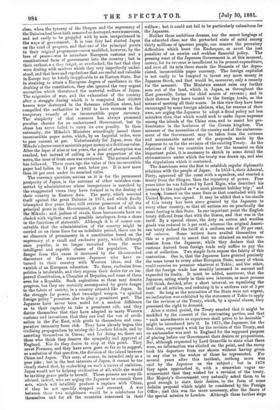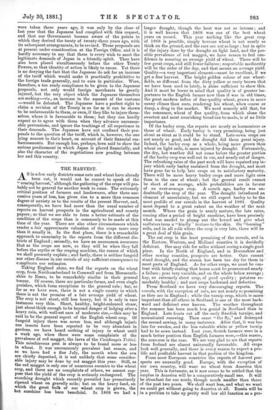THE RELATIONS OF GREAT BRITAIN WITH JAPAN.
-VERY few persons appear to be aware of the important and delicate questions which are in progress of discussion at this moment, in connection with the relations between Great Britain and Japan. And this state of ignorance is the more to be regretted, because statements have been made that are not in strict accordance with the facts, and because views have been put forward which, if they were to gain any general acceptance, would inevitably prove prejudicial not merely to England and other foreign States, but also, and in a still stronger degree, to Japan herself. It is, therefore, in the interests of truth, and in the hope that we may help towards removing some erroneous impressions, that we propose to place before our readers the following narrative of our relations with Japan, in special reference to the possible revision of our Treaty with that country, but also with due regard to its own internal condition.
Thirteen years have elapsed since the Mikado was taken from his place of retirement at Kioto, and restored to the throne of his ancestors, whose temporal power had been usurped by the Shogun. That event was followed, after an interval of several years, by the Satsuma rebellion, which closed with the triumph of the Mikado's arms, and completed the overthrow of the great feudal system of the Daimios. The effort to emanci- pate themselves from an enervating yoke had cost the people of Japan many thousands of lives and millions of money, but the result repaid the means. Still, Japan was left in 1877, when this intestine strife ceased, in a more or less exhausted condition. Its revenue had fallen off, and its debt, both external and in- ternal, had risen to the very large total of seventy millions of pounds sterling. The difficulties which beset the new ruling
class, when the tyranny of the Shogun and the supremacy of the Daimios had been both removed or destroyed, were numerous, and not easily to be grappled with by men inexperienced in the ways of government. It is true they had started Japan on the road of progress, and that one of the principal points in their original programme—soon modified, however, by the love of peace—was to introduce European customs and a constitutional form of government into the country ; but in their enthusicsai they forgot, or overlooked, the fact that they were dealing with matters which they very imperfectly under- stood, and that laws and regulations that are useful and valuable in Europe may be totally inapplicable to an Eastern State. But in straining to attain a European degree of excellence in the drafting of the constitution, they also ignored the very urgent necessities which threatened the material welfare of Japan.
The exigencies of war, and the exhaustion of the country after a struggle during which it is computed that 50,000 houses were destroyed in the Satsuma rebellion alone, had compelled the authorities in 1869 to have recourse to the temporary remedy of an inconvertible paper currency.
The simplicity of that resource has always possessed peculiar charms for an embarrassed Government, but its abuse has never failed to carry its own penalty. In their extremity, the Mikado's Ministers accordingly issued these inconvertible paper notes, which, by an Imperial order, were to pass current at par. Unfortunately for Japan, even the Mikado's decree cannot maintain paper money at a fictitious value.
After the lapse of nine or ten years, the point of absorption was reached, but instead of calling in a due proportion of the notes, the issue of fresh ones was continued. The natural result has followed. Three years ago the value of this inconvertible paper had fallen to 14 per cent. below par. It is now more than 50 per cent, under its nominal value. The currency question, serious as it is for the permanent prosperity of Japan, is the outcome of other mistakes com- mitted by administrators whose inexperience is matched by the exaggerated views they have formed as to the destiny of their country in Eastern Asia. The party, which asserted itself against the great Daimios in 1871, and which finally triumphed five years later, still retains possession of all the principal posts in the Government, at the head of which is
the Mikado ; and, jealous of rivals, these bureaucrats have ex- cluded with vigilant care all possible interlopers from a share in the functions of statecraft. Although it is of course con- ceivable that the administration of the country might be carried on on these lines for an indefinite period, there can be no elements of permanency in a constitution based on the supremacy of a small and exclusive party, which, although once popular, is no longer recruited from the more intelligent and capable classes of the population. The danger from this cause is increased by the ill-concealed discontent of the numerous Japanese who have re- turned to their country with Western ideas, and the varnish of an European education. To them, exclusion from politics is intolerable, and they express their desire for an im- proved Constitution, a Chamber of Deputies, and some of them even for a Republic. Such aspirations as these may denote progress, but they are certainly accompanied by grave danger to the fabric of society, in a country situated like Japan. In the struggle for power, that two-edged weapon "a spirited foreign policy" promises also to play a prominent part. The Japanese have never been noted for a modest diffidence as to their capacity to take a prominent role, and they flatter themselves that they have adopted so many Western customs and inventions, that they can lead the van of civili- sation in the Far East, with profit to themselves and com- parative immunity from risk. They have already begun this civilising propagandum by seizing the Loochoo Islands, and by asserting themselves in Corea ; and for doing so, there are those who think they deserve the sympathy and approval of England. Nor do they desire to stop at this point. They covet Formosa, and they have even gone so far as to suggest, as a solution of that question, the division of the island between China and Japan. This may, of course, be intended only as a poor joke ; but in the best interests of Japan, it cannot be too clearly stated that, by embarking on such a career of ambition, Japan would not be helping civilisation at all, while she would be inviting grave perils to herself. Those persons are very ill- advised, indeed, who are urging the Japanese to commit these acts, which will infallibly produce a rupture with China, if they be not speedily stopped and reversed. A war between these two neighbours would be a misfortune for themselves and for all the countries concerned in their
welfare; but it could not fail to be particularly calamitous for the Japanese.
Neither these ambitious dreams, nor the secret longings of the educated class, nor the perturbed state of mind among thirty millions of ignorant people, can remove the pecuniary difficulties which beset the Exchequer, or avert the just penalties of an unwise and reckless financial policy. The pressing want of the Japanese Government is, at this moment, money, for its revenue is insufficient to its present expenditure, and over all its acts there stands the Nemesis of the depre- ciated, inconvertible paper currency, The foreign capitalist is not easily to be tempted to invest any more money in Japanese Stock, and that would be, moreover, only a remedy for the moment. The Ministers cannot raise any further sum out of the land, which in Japan, as throughout the East generally, forms the chief source of revenue ; and in their distress they have turned to the foreign trade, as the means of meeting all their wants. In this view they have been encouraged by some foreign advisers, who, for reasons of their own, are urging the Japanese to adopt a fiscal policy not less mistaken than that which would seek to make Japan supreme among the islands of the China seas, and to assert her pre-. dominance in the harbours of the Corean kingdom. The measure of the necessities of the country and of the embarrass- ment of the Government may be taken from the extreme and unreasonable nature of the proposals made by the Japanese to us for the revision of the existing Treaty. As the relations of the two countries turn for the moment on this important point, it is necessary to sketch in some detail the circumstances under which the treaty was drawn up, and also the stipulations which it contained.
The Americans were the first to establish regular diplomatic relations with the people of Japan. In 1853-4, their Admiral, Perry, appeared off the coast with a squadron, and exacted a treaty from the Shogun, then the repository of power. Four years later he was followed by Lord Elgin, who described his journey to the capital as "a most pleasant holiday trip ;" and a treaty, framed on the same lines as that concluded with the United states, was signed. It may be added that a fac-simile of this treaty has been since granted by the Japanese to every other country, so that all nations are on practically the same footing in this State. In one important point the English treaty differed from that with the States, and that was in the tariff. By a special clause, the duty on cotton and woollen goods was reduced to 5 per cent., whereas the original Ameri- can treaty defined the tariff at a uniform rate of 20 per cent.
ad valorem. Some writers have availed themselves of this as a pretext to assert that we obtained an unfair con- cession from the Japanese, while they declare that the customs derived from foreign trade only suffice to pay the cost of collection. Two simple facts expose the falsity of this contention. One is, that the Japanese have granted precisely the same terms to every other European State, many of whom could exercise no pressure whatever at Tokio ; and the other, that the foreign trade has steadily increased in amount and expanded its limits. It must be added, moreover, that the Japanese, acting wisely in their own interests, as most persons will think, decided, after a short interval, on equalising the tariff on all articles, and reducing it to a uniform rate of 5 per cent. So long as the necessities of the State were not urgent, no inclination was exhibited by the statesmen of Tokio to apply for the revision of the Treaty, which, by a special clause, they possessed the right to demand.
After a stated period, the Treaty enacted that it might be modified by the consent of the contracting parties, and that "such amendments as experience shall prove to be desirable" might be introduced into it. In 1871, the Japanese, for the first time, expressed a wish for the revision of this Treaty, and an ambassador was sent to England for the supposed purpose of placing before our Government their desires or propositions. But, although requested by Lord Granville to state what these were, no information was elicited on the point, and the envoy took his departure from our shores without having given us any clue to the wishes of those he represented. For several years after this incidenti , nothing more was said by the Japanese on the subject ; but in. 1878 they again approached it, with -a somewhat vague an- nouncement that they, wished for a -revision of the treaty. Her Majesty's Government. very naturally asked .them to be good enough to state their desires, in the form of some definite proposal which might be considered by the Foreign Office ; and this was the more necessary, after the fiasco of the special mission to London. Although these further steps
were taken three years ago, it was only by the close of last year that the Japanese had complied with this request, and that our Government became aware of the points in which they desired the treaty of twenty-three years ago, with its subsequent arrangements, to be revised. These proposals are at present under consideration at the Foreign Office, and it is hardly necessary to say that there is every wish to meet the legitimate demands of Japan in a friendly spirit. They have also been placed simultaneously before the other Treaty Powers, so that identity of action is likely to ensue. Yet there is no denying the fact that the Japanese do ask for an increase of the tariff which would make it practically prohibitive to the foreign trade generally, and to ours in particular. Were, therefore, a too ready compliance to be given to the Japanese proposals, not only would foreign merchants be greatly injured, but the very object which the Japanese themselves are seeking—viz., an increase in the amount of the customs —would be defeated. The Japanese have a perfect right to claim a revision of the Treaty in so far as it can be shown to be unfavourable to them, or even, if they like to injure them- selves, where it is favourable to them; but they can hardly expect us to agree with them when they advance unreason- able pretensions, and ignore the teachings of all experience in their demands. The Japanese have not confined their pro- posals to the question of the tariff, which is, however, the one lying nearest to their heart, on account of their financial em- barrassments. But enough has, perhaps, been said to show the serious predicament in which Japan is placed financially, and also the character of the negotiations now pending between her and this country.




































 Previous page
Previous page